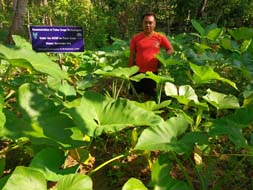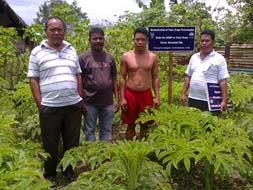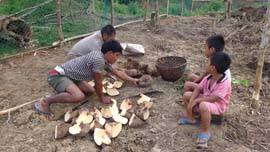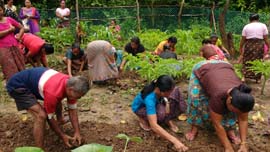The prime source of livelihood of the Nicobarese, a dominant tribe among the tribes living in Andaman & Nicobar Islands is based on the plantation crops, such as, coconut and fishing. Their cultivation practices are unique and entirely different from the other farming community. The people lives in joint family system and adopt the “Tuhet” Garden System (a joint family farming system where the land owned by community and the resources and outputs are shared) for cultivating the Tuber and other crops.



The ICAR-Central Island Agricultural Research Institute (CIARI) has initiated an effort for imparting the scientific knowledge on the Tuber Crops based farming system at the tribal village Harminder Bay in Little Andaman through the participatory mode under the All India Coordinated Research Project on Tuber Crops. The village has 15 tuhets with an average area of 0.44 ha per tuhet garden.
The Institute selected 10 tribal farmers to conduct the tuber crop based farming system demonstrations. Each farmer’s field of 200 m2 area was selected and properly fenced in the vicinity of the tribal settlement. The selected farmers were sensitized about the tuber crops based farming systems through trainings and were supplied with the planting materials of elephant foot yam, ginger, colocasia and 3 piglets each 3 to 4 months old (weighing 7 to 8 Kgs). The crops were planted in the month of May and harvested 8 months after the planting (December). The crops were grown under the natural farming practices without any added manures and fertilizers. The increase in body weight of pigs was calculated for 12 months. The tuber crop based farming system has resulted in increasing the gross and net returns as well as B:C ratio. Being preferred by the tribal farmers, the elephant foot yam has created demand and enthusiasm among them. Based on the success of the intervention, in the subsequent years, 15 farmers have adopted the tuber crops based integrated farming system (0.03 ha) during the Years - 2015-16 and 2016-17. During the Year - 2017-18 and 2018-19, further demonstrations were taken up in 6 ‘tuhet’ gardens comprising of 0.2 Ha areas each.


The demonstrations of tuber crops based farming system in 0.2 ha model have shown that the net income of each ‘tuhet’ was increased from Rs. 42,200 with B:C ratio of 1.33 (prior to interventions), to Rs. 1,32,820 with the B:C ratio of 2.08 (after intervention). The increase in income was due to integration of tuber crops and pigs.
Since, the pig plays a pivotal role in the social and economic aspects of the Nicobarese tribal community, the model is very much liked by them. The employment generation in the tuber crops based farming system was estimated at 510 man days / ha as compared to 295 man days / ha in their traditional system showing marked increase in the employment generation. With the success of the system, more tribal youths have come forward for adopting the tuber crops based farming system as their livelihood options.
The system was led to triple the tribal farmers’ income along with increasing the employment generation to the tune of over 70% in the tribal areas of Little Andaman. The potential of the system is providing the additional income, employment and enhancement of food availability in the island ecosystems.
(Source: ICAR-Central Island Agricultural Research Institute, Port Blair)








Like on Facebook
Subscribe on Youtube
Follow on X X
Like on instagram